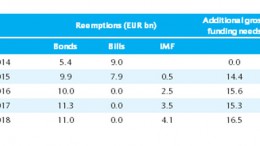ZURICH | UBS analysts | Corporate bond markets in Europe have been quite resilient through these past few sessions in both IG and HY, offering relatively good outperformance. It would appear it is increasingly becoming a case of just buy it (corporate bonds), because that’s what’s best. Don’t worry, one will be looked after – the ‘structure’ after all is in place. There may be no growth, but you are promised low interest rates (zero at the front end), low funding yields (lowest ever, iBoxx corporate bond yields at 1.4%), a low default rate (less than 3%) and your money back at maturity.








